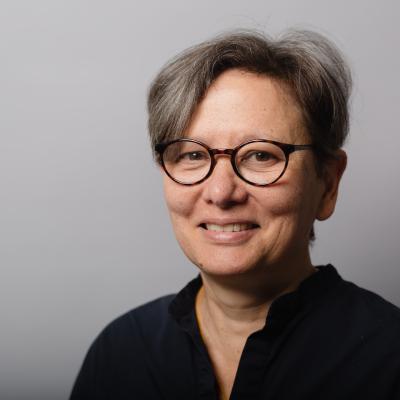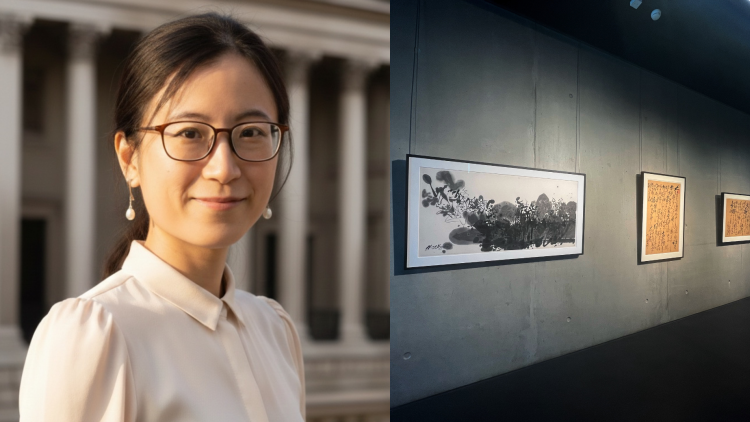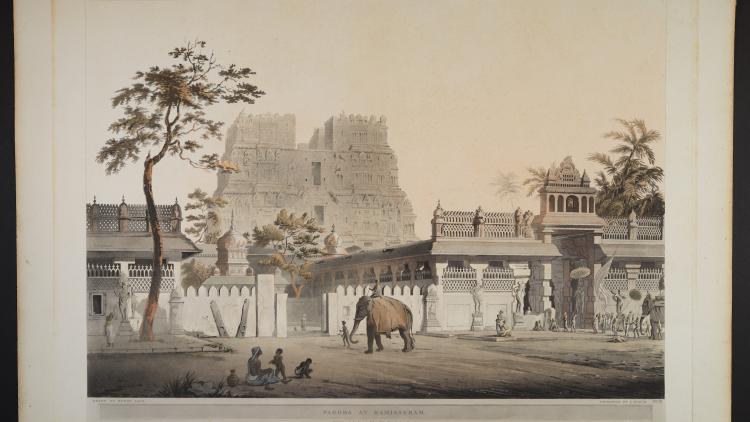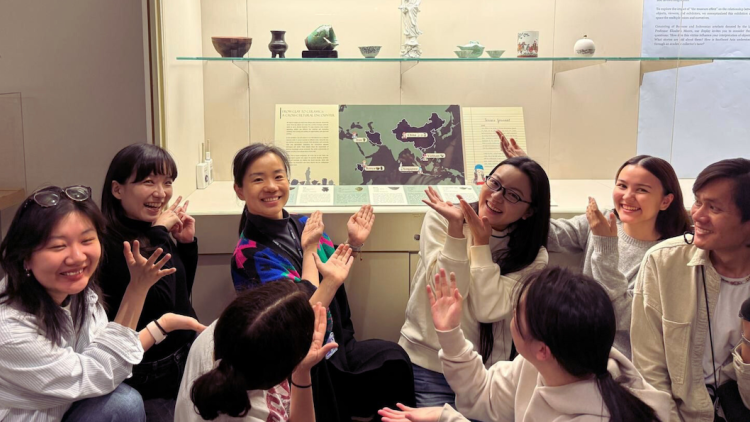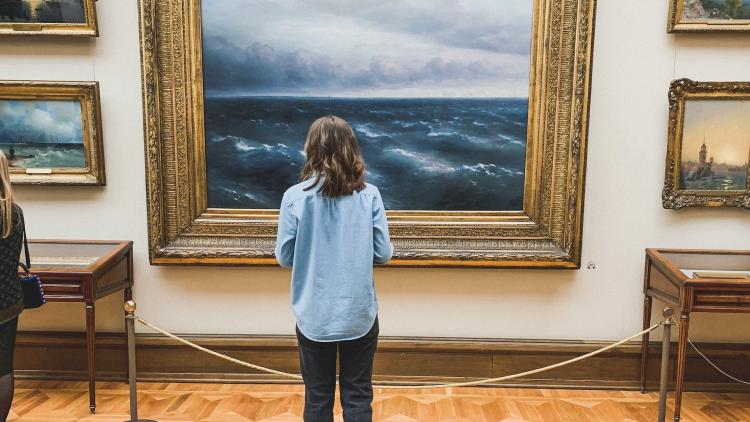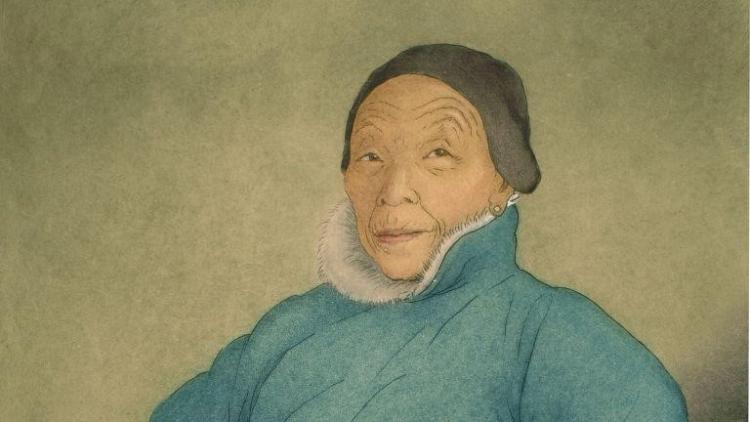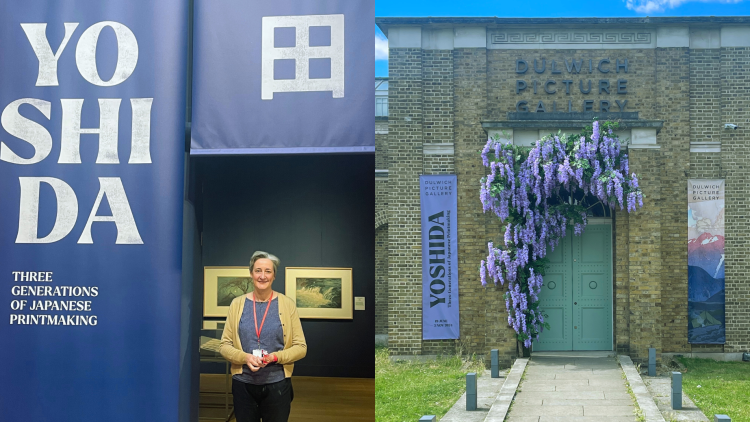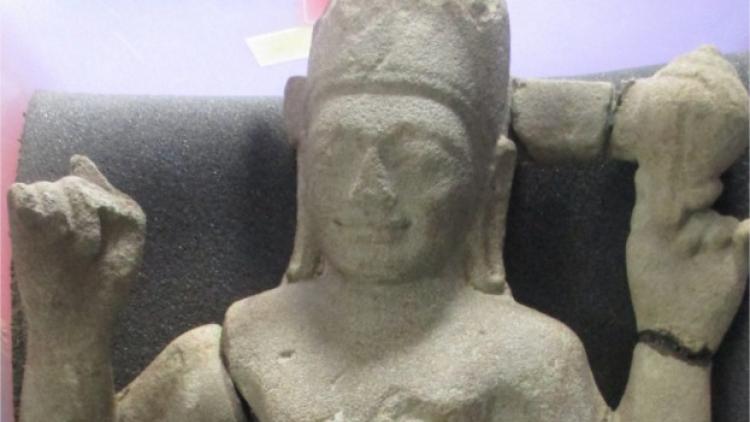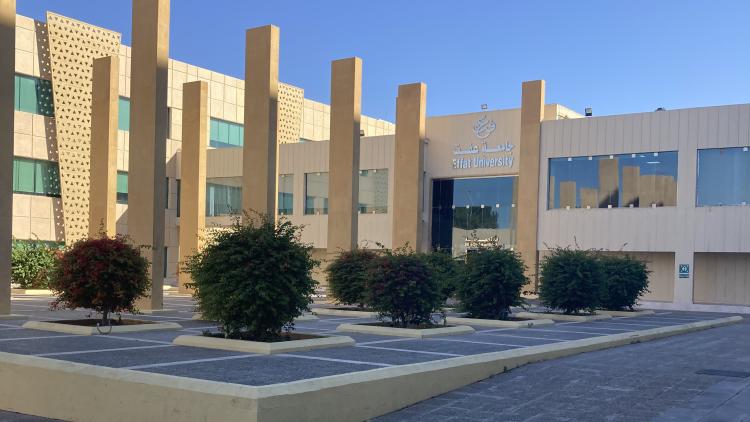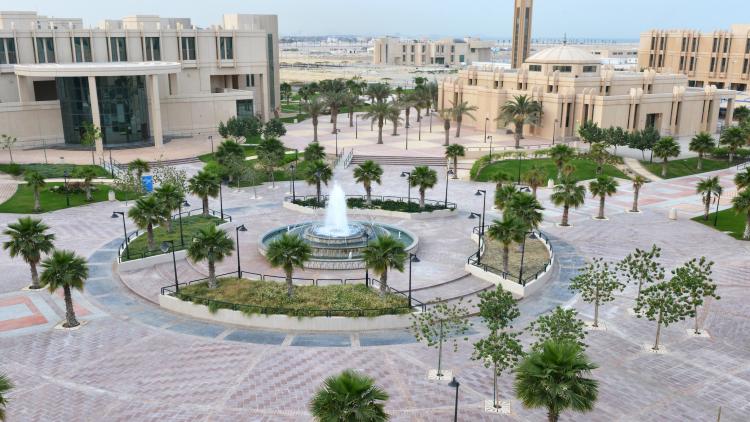MA Curating Cultures
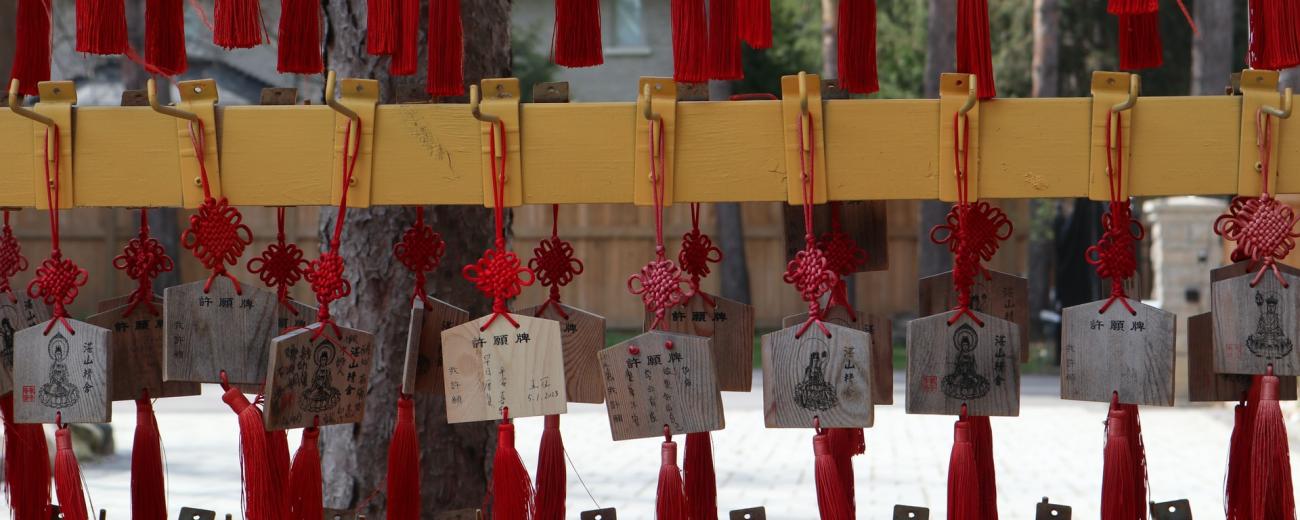

Key information
- Duration
- 1 year
- Start of programme
- September
- Attendance mode
- Full time or part time
- Location
- On Campus
- Fees
-
Home: £12,965
International: £25,320 - Course code
- PSO-CURCUL1FD, PSO-CURCUL2PD
- Entry requirements
-
We will consider all applications with a 2:2 (or international equivalent) or higher in a relevant subject.
-
Afghanistan: Qualifications (Bachelor equivalency): Master's degree
Equivalent to 2:ii: 80% or 3.3/4.0
-
Albania: Qualifications (Bachelor equivalency): First Level Diploma (Diploma e nivelit te para) (3 Years) from a recognised institution
Equivalent to 2:ii: 7/10
-
Algeria: Qualifications (Bachelor equivalency): Licence; Diplome de [subject area]; Diplome d'Etudes Superieures; Diplome de Docteur end Pharmacie; or Diplome de Docteur en Medecine from a recognised institution
Equivalent to 2:ii: 12/20
-
Antigua and Barbuda: Qualifications (Bachelor equivalency): Bachelor's degree from the University of the West Indies
Equivalent to 2:ii: 2.7/4, B-, 60% or Lower Second Class Hons
-
Argentina: Qualifications (Bachelor equivalency): Titulo/ Grado de Licenciado/ Titulo de [subject area] (minimum 4 years) from a recognised institution
Equivalent to 2:ii: 6/10 or Bueno
-
Australia: Qualifications (Bachelor equivalency): Bachelor's degree from a recognised institution
Equivalent to 2:ii: 2:2 / Credit / 60%
-
Austria: Qualifications (Bachelor equivalency): Bachelor's degree from a recognised institution
Equivalent to 2:ii: 3.5/5.0 and overall Pass (Bestanden)
-
Azerbaijan: Qualifications (Bachelor equivalency): Bachelor's degree (Bakalavr Diplomu) from recognised institution
Equivalent to 2:ii: 70% or 3.5
-
Bahamas: Qualifications (Bachelor equivalency): Bachelor's degree from the University of the West Indies
Equivalent to 2:ii: 2.7/4, B-, 60% or Lower Second Class Hons
-
Bahrain: Qualifications (Bachelor equivalency): Bachelor's degree from a recognised institution
Equivalent to 2:ii: 74% or 2.67
-
Bangladesh: Qualifications (Bachelor equivalency): Master's degree from a recognised institution OR 4 Year Bachelor's degree from SELECTED institutions
Equivalent to 2:ii: Masters: 55% or 2.7. Bachelor: 60% or 3.0
-
Belgium: Qualifications (Bachelor equivalency): Licentiaat (Flanders) or Licencié (Wallonia). Post 2005 Bachelor/Bachelier 180 ECT degree from a recognised institution
Equivalent to 2:ii: 60% or 12/20 (Flanders); or 65% (Wallonia). Bachelor: 60% or 12/20
-
Bolivia: Qualifications (Bachelor equivalency): Licenciado or Título de [subject area] from a recognised institution. Minimum of 4 year
Equivalent to 2:ii: 67%
-
Botswana: Qualifications (Bachelor equivalency): Bachelor's degree (minimum 5 years) or Master Degree from the University of Botswana
Equivalent to 2:ii: C / 60% / 2:2
-
Brazil: Qualifications (Bachelor equivalency): Título de Bacharel / Título de [subject area] / Título de Licenciado/a (4 years) from a recognised institution
Equivalent to 2:ii: 6.5 or 65%
-
Brunei: Qualifications (Bachelor equivalency): Bachelor's degree (Honours) from recognised institution
Equivalent to 2:ii: Lower Second Class Hons; 50% / 3.5 out of 5.0
-
Bulgaria: Qualifications (Bachelor equivalency): Bachelor's degree from a recognised institution
Equivalent to 2:ii: 4.0/6.0
-
Burkina Faso: Qualifications (Bachelor equivalency): Diplome d'Etudes Approfondies. Diplome d'Etudes Superieures Specialisees
Equivalent to 2:ii: 13/20
-
Burma / Myanmar: Qualifications (Bachelor equivalency): Master's degree from a recognised institution
Equivalent to 2:ii: B- or 55% or 3.0/5.0 or 2.5/4.0
-
Cambodia: Qualifications (Bachelor equivalency): Master's degree from recognised institution
Equivalent to 2:ii: 65% or 2.7/4.0
-
Cameroon: Qualifications (Bachelor equivalency): Diplôme d'Ingénieur/ Diplôme d'Études Supérieures de Commerce (5 years) from a recognised institution
Equivalent to 2:ii: 12 (assez bien) or 2.5. 70-74/ B+
-
Canada: Qualifications (Bachelor equivalency): Bachelor's degree from a recognised institution
Equivalent to 2:ii: 2.7 or 67%
-
Chile: Qualifications (Bachelor equivalency): Grado de Licenciado en [subject area] or Titulo (Professional) de [subject area] (min 4 years) from recognised institution
Equivalent to 2:ii: 5.0/7
-
China Qualifications (Bachelor equivalency): Bachelor's degree (4 years) 学士学位 from a recognised institution
Equivalent to 2:ii: 70-75% or 2.5-2.9/4.0 (depending on university)
-
Colombia: Qualifications (Bachelor equivalency): Licenciado en [subject area] or Titulo de [subject area] (minimum 4 years) from recognised institution
Equivalent to 2:ii: 3.5/5.0
-
Croatia: Qualifications (Bachelor equivalency): Baccalaureus / Baccalaurea (Bachelor's degree) from a recognised institution
Equivalent to 2:ii: 3.0/5.0
-
Cuba: Qualifications (Bachelor equivalency): Titulo de Licenciado/ Arquitecto/ Doctor/ Ingeniero from a recognised institution
Equivalent to 2:ii: 3.5/5.0
-
Cyprus: Qualifications (Bachelor equivalency): Bachelor's degree from a recognised institution
Equivalent to 2:ii: 6.0/10 or 2.7/4.0
-
Czech Republic: Qualifications (Bachelor equivalency): Bachelor's degree (180 ECTS) from a recognised institution
Equivalent to 2:ii: 2.0/4.0
Information for prospective students from the Czech Republic
-
Denmark: Qualifications (Bachelor equivalency): Bachelor's degree from a recognised institution
Equivalent to 2:ii: 5/12 or 6/13
-
Dominica: Qualifications (Bachelor equivalency): Bachelor's degree from the University of the West Indies
Equivalent to 2:ii: 2.7/4, B-, 60% or Lower Second Class Hons
-
Dominican Republic: Qualifications (Bachelor equivalency): Título de Licenciado/Título de [subject] upon completion of 4-year Licenciatura
Equivalent to 2:ii: 65% or 6.5/10
-
Ecuador: Qualifications (Bachelor equivalency): Bachelor's degree from recognised university
Equivalent to 2:ii: 70% / 7
-
Egypt: Qualifications (Bachelor equivalency): Bachelor's degree from recognised university
Equivalent to 2:ii: 65% or 2.7/4.0
-
Estonia: Qualifications (Bachelor equivalency): Bakalaurusekraad from a recognised institution; University Specialist's Diploma; Professional Higher Education Diploma
Equivalent to 2:ii: 3.0/5.0 or C
-
Ethiopia: Qualifications (Bachelor equivalency): Master's degree from recognised public or HERQA-accredited private institution
Equivalent to 2:ii: 2.5/5.0
-
Fiji: Qualifications (Bachelor equivalency): Bachelor's degree (4 years) from the University of the South Pacific
Equivalent to 2:ii: B/3.0
-
Finland: Qualifications (Bachelor equivalency): Bachelor/Kandidaatti/Kandidat (180 ECTS credits) from a recognised institution
Equivalent to 2:ii: 2.5/4.0 or 1.4/3.0
-
France: Qualifications (Bachelor equivalency): Grade de Licence from a recognised institution OR three years of study from a grande école
Equivalent to 2:ii: 11/20
-
Gambia: Qualifications (Bachelor equivalency): 2-year Master's degree from recognised university
Equivalent to 2:ii: 2.7/4.3 or 60%
-
Georgia: Qualifications (Bachelor equivalency): Bachelor's degree (Bakalavris Khariskhi) from a recognised institution
Equivalent to 2:ii: 71%/C/ Good
-
Germany: Qualifications (Bachelor equivalency): Bachelor's degree (180 ECTS) from a recognised institution
Equivalent to 2:ii: Befriedigend: 2.6-3.5/5.0
-
Ghana: Qualifications (Bachelor equivalency): Bachelor's degree from a recognised institution
Equivalent to 2:ii: Lower Second Class Hons
-
Greece: Qualifications (Bachelor equivalency): Bachelor's degree from a recognised institution
Equivalent to 2:ii: 6/10 (University) or 6.8/10 (Tech Institutes)
-
Grenada: Qualifications (Bachelor equivalency): Bachelor's degree from the University of the West Indies
Equivalent to 2:ii: 2.7/4, B-, 60% or Lower Second Class Hons
-
Haiti: Qualifications (Bachelor equivalency): Bachelor's degree from the University of the West Indies
Equivalent to 2:ii: 2.7/4, B-, 60% or Lower Second Class Hons
-
Hong Kong: Qualifications (Bachelor equivalency): Bachelor's degree from a recognised institution
Equivalent to 2:ii: 2.5/4.0 or Lower Second Class Honours
-
Hungary: Qualifications (Bachelor equivalency): Bachelor's degree (Alapfokozat) or Diploma (Egyetemi Oklevél) from a recognised institution
Equivalent to 2:ii: 3.5/5.0
-
Iceland: Qualifications (Bachelor equivalency): Bachelor's degree (Baccalaureus or Bakkalarprof) from a recognised institution
Equivalent to 2:ii: 6.5 out of 10
-
India: Qualifications (Bachelor equivalency): Bachelor's degree (3 or 4 years) from a recognised institution
Equivalent to 2:ii: Top unis: 55%, or 5.5/10. All other: 60%, or 6.0/10; or 5.0/8.0
-
Indonesia: Qualifications (Bachelor equivalency): Bachelor's degree or Sarjana I (S1) from a recognised institution
Equivalent to 2:ii: 2.7/4.0
-
Iran: Qualifications (Bachelor equivalency): Licence/ Karshenasi (4-year Bachelor) from a recognised institution
Equivalent to 2:ii: 13/20
-
Iraq: Qualifications (Bachelor equivalency): Bachelor's degree (4-year) from a recognised institution
Equivalent to 2:ii: 65% or Good
-
Ireland: Qualifications (Bachelor equivalency): Bachelor's degree from a recognised institution
Equivalent to 2:ii: Second Class Honours Grade II
-
Israel: Qualifications (Bachelor equivalency): Bachelor's degree from a recognised institution
Equivalent to 2:ii: 65%
-
Italy: Qualifications (Bachelor equivalency): Laurea (180 ECTS) from a recognised institution
Equivalent to 2:ii: 94/110
-
Jamaica: Qualifications (Bachelor equivalency): Bachelor's degree from the University of the West Indies
Equivalent to 2:ii: 2.7/4, B-, 60% or Lower Second Class Hons
-
Japan: Qualifications (Bachelor equivalency): 学士 (Bachelor's degree) from a recognised institution
Equivalent to 2:ii: 70-75% / Good/ B or 2.7/ 4.0
-
Jordan: Qualifications (Bachelor equivalency): Bachelor's degree from recognised institution
Equivalent to 2:ii: 2.5/4.0 or 70%
-
Kazakhstan: Qualifications (Bachelor equivalency): Bachelor's (Bakalavr Diplomi) or Specialist Diploma from recognised institution
Equivalent to 2:ii: 2.67/4.0 or 3.5/5.0
-
Kenya: Qualifications (Bachelor equivalency): Bachelor's degree from a recognised institution
Equivalent to 2:ii: 2:2 or 50-59% or 2.4/4.0
-
Kuwait: Qualifications (Bachelor equivalency): Bachelor's degree from a recognised institution
Equivalent to 2:ii: GPA 2.67/4.0
-
Kyrgyzstan: Qualifications (Bachelor equivalency): Bachelor's degree or specialist diploma (min 4 years) from a recognised institution
Equivalent to 2:ii: 3.5/5.0 or 2.67/4.0
-
Latvia: Qualifications (Bachelor equivalency): Bakalaura Diploms (Bachelor's) or Profesionālā Bakalaura Diploms (Professional Bachelor's) from a recognised institution
Equivalent to 2:ii: 6/10
-
Lebanon: Qualifications (Bachelor equivalency): Bachelor's degree / Licence from a recognised institution
Equivalent to 2:ii: 70% or C or 2.7/4.0 or 12/20
-
Liberia: Qualifications (Bachelor equivalency): Master's degree from a recognised institution
Equivalent to 2:ii: 75% or 2.8/4.0
-
Libya: Qualifications (Bachelor equivalency): Bachelor's degree from selected institution
Equivalent to 2:ii: 65% or 2.8/4.0
-
Lithuania: Qualifications (Bachelor equivalency): Bachelors/Bakalauro (180 ECTS) from a recognised institution
Equivalent to 2:ii: 7/10
-
Luxembourg: Qualifications (Bachelor equivalency): Bachelor's degree from a recognised institution
Equivalent to 2:ii: 12/20
-
Macedonia: Qualifications (Bachelor equivalency): Bachelor's degree from a recognised institution
Equivalent to 2:ii: 7/10 or 2:2
-
Malawi: Qualifications (Bachelor equivalency): Master's degree from a recognised institution
Equivalent to 2:ii: 60% or 2.4/4.0
-
Malaysia: Qualifications (Bachelor equivalency): Bachelor's degree from a recognised institution
Equivalent to 2:ii: 2.6/4.0 or B- (Class 2 Division 2)
-
Maldives: Qualifications (Bachelor equivalency): Bachelor's degree from the Maldives National University (MNU)
Equivalent to 2:ii: 50%
-
Malta: Qualifications (Bachelor equivalency): Bachelor degree from a recognised institution
Equivalent to 2:ii: Lower Second Class / 60% / Category IIB
-
Mexico: Qualifications (Bachelor equivalency): Titulo de Licenciado from a recognised institution
Equivalent to 2:ii: 7.5/10
-
Morocco: Qualifications (Bachelor equivalency): Licence/Licence d'Etudes Fondamentales/Licence Professionnelle from a recognised institution
Equivalent to 2:ii: 11/20
-
Namibia: Qualifications (Bachelor equivalency): Bachelor's degree from a recognised institution
Equivalent to 2:ii: 60% or 2.5/4.0
-
Nepal: Qualifications (Bachelor equivalency): Master's degree / Bachelor's (4-year) from select institutions
Equivalent to 2:ii: 55% or 2.4/4.0
-
Netherlands: Qualifications (Bachelor equivalency): Bachelor's degree from a recognised institution
Equivalent to 2:ii: 6/10 or 2.7/4.0
-
New Zealand: Qualifications (Bachelor equivalency): Bachelor's degree (3 or 4 years) from a recognised institution
Equivalent to 2:ii: Lower Second Class Hons
-
Nigeria: Qualifications (Bachelor equivalency): Bachelor's degree from a recognised institution
Equivalent to 2:ii: Lower Second Class Hons
-
Norway: Qualifications (Bachelor equivalency): Bachelors/Bachelorgrad (180 ECTS) or Candidatus/a magisterii from a recognised institution
Equivalent to 2:ii: Overall C
-
Oman: Qualifications (Bachelor equivalency): Bachelor's degree from a recognised institution
Equivalent to 2:ii: 2.7/4.0
-
Pakistan: Qualifications (Bachelor equivalency): Bachelor's degree (4-year) from HEC recognised institution or 2 year BA + 2 year MA from HEC recognised institution
Equivalent to 2:ii: CGPA 2.7 or 55%
-
Palestine: Qualifications (Bachelor equivalency): Bachelor degree (4-year) from a recognised institution
Equivalent to 2:ii: 75% or or 2.7/4.0
-
Papua New Guinea: Qualifications (Bachelor equivalency): Bachelor's (Honours) degree from a recognised institution
Equivalent to 2:ii: Class II Division B
-
Peru: Qualifications (Bachelor equivalency): Licenciado or Professional Title from a recognised institution
Equivalent to 2:ii: 12/20
-
Philippines: Qualifications (Bachelor equivalency): Master’s from recognised institution or Centre of Excellence; or Bachelor's from prestigious institution or Centre of Excellence.
Equivalent to 2:ii: 2.5/4.0 or 80% or 2.5/5.0 or Cum Laude
-
Poland: Qualifications (Bachelor equivalency): Licencjat or Inżynier from a recognised institution
Equivalent to 2:ii: 3.8/5.0
-
Portugal: Qualifications (Bachelor equivalency): Licenciado (180 ECTS) from a recognised institution
Equivalent to 2:ii: 12/20
-
Qatar: Qualifications (Bachelor equivalency): Bachelor's degree from a recognised institution
Equivalent to 2:ii: 2.7/4.0 or 3.3/5.0
-
Romania: Qualifications (Bachelor equivalency): Diplomă de Licenţă/Diplomă de Inginer/Diplomă de Urbanist Diplomat from a recognised university
Equivalent to 2:ii: 7/10
-
Russia: Qualifications (Bachelor equivalency): Diplom Bakalavra or Specialist Diploma from a recognised institution
Equivalent to 2:ii: 3.5/5.0
-
Rwanda: Qualifications (Bachelor equivalency): Bachelor's degree (4-year) from a recognised institution
Equivalent to 2:ii: Lower Second Class Hons; 60%; or 13/20
-
Saudi Arabia: Qualifications (Bachelor equivalency): Bachelor's degree from a recognised institution
Equivalent to 2:ii: 3.5/5.0 or 2.7/4.0 or 70%
-
Serbia and Montenegro: Qualifications (Bachelor equivalency): Bachelor's degree from a recognised institution
Equivalent to 2:ii: 7 / Good
-
Sierra Leone: Qualifications (Bachelor equivalency): Bachelor's Honours degree from a recognised institution
Equivalent to 2:ii: Lower Second Class Hons; 55%; 3.4/5.0; 2.75/4.0
-
Singapore: Qualifications (Bachelor equivalency): Bachelor's degree from a recognised institution
Equivalent to 2:ii: 3.3/5.0 or 2.8/4.0
-
Slovakia: Qualifications (Bachelor equivalency): Bachelor's degree (Bakalár) from a recognised institution
Equivalent to 2:ii: 70%; or 2.0 overall; or C
-
Slovenia: Qualifications (Bachelor equivalency): Diploma o pridobljeni univerzitetni izobrazbi (University Degree) or Diploma o pridobljeni visoki strokovni izobrazbi / Diplomirani (Diploma of Professional Higher Education) or Diplomant or Univerzitetni diplomant (first degree)
Equivalent to 2:ii: 7 out of 10
-
Solomon Islands: Qualifications (Bachelor equivalency): Bachelor's degree (4-year) from the University of the South Pacific
Equivalent to 2:ii: B/3.0
-
Somalia: Qualifications (Bachelor equivalency): Do not accept national qualifications for direct entry
Equivalent to 2:ii: N/A
-
South Africa: Qualifications (Bachelor equivalency): Bachelor's degree (4-year) from a recognised institution
Equivalent to 2:ii: 60%
-
South Korea: Qualifications (Bachelor equivalency): Bachelor's degree from a recognised institution
Equivalent to 2:ii: GPA 2.5/4.0; or 2.8/4.3; or 3.0/4.5
-
Spain: Qualifications (Bachelor equivalency): Título de Grado / Título de Licenciado / Título de Ingeniero / Titulo de Arquitecto from a recognised institution
Equivalent to 2:ii: 6/10 or 1.5/4.0
-
Sri Lanka: Qualifications (Bachelor equivalency): Bachelor Special Degree or Professional Degree (4-year) from a recognised institution
Equivalent to 2:ii: 55% or 2:2 or 3.0/4.0
-
St Kitts and Nevis: Qualifications (Bachelor equivalency): Bachelor's degree from the University of the West Indies
Equivalent to 2:ii: 2.7/4, B-, 60% or Lower Second Class Hons
-
St Vincent and the Grenadines: Qualifications (Bachelor equivalency): Bachelor's degree from the University of the West Indies
Equivalent to 2:ii: 2.7/4, B-, 60% or Lower Second Class Hons
-
Sudan: Qualifications (Bachelor equivalency): Bachelor's degree (5-year) from a recognised institution
Equivalent to 2:ii: 60% or B
-
Sweden: Qualifications (Bachelor equivalency): Bachelor's Degree/Kandidatexamen/Yrkesexamen from a recognised institution
Equivalent to 2:ii: Pass OR Godkänd (with a minimum of 90 credits at Good - C)
-
Switzerland: Qualifications (Bachelor equivalency): Diplom/Diplôme;Lizentiat;Staatsdiplom/Diplôme d’Etat from a recognised institution
Equivalent to 2:ii: 4/6; or 6/10: or 3/5
-
Syria: Qualifications (Bachelor equivalency): Bachelor's degree (Licence/ al-ijaza-fi) from a recognised institution
Equivalent to 2:ii: 65%+ or 'Good' from a public university
-
Taiwan: Qualifications (Bachelor equivalency): Bachelor's degree from a recognised institution
Equivalent to 2:ii: 65-70% or GPA 2.6/4.0 - 2.8/4.0
-
Tanzania: Qualifications (Bachelor equivalency): Bachelor's degree from a recognised institution
Equivalent to 2:ii: 2:2; or Lower Second; or GPA 2.7/5.0
-
Thailand: Qualifications (Bachelor equivalency): Bachelor's degree from a recognised institution
Equivalent to 2:ii: 2.6/4.0
-
Trinidad and Tobago: Qualifications (Bachelor equivalency): Bachelor's Degree from UWI
Equivalent to 2:ii: B-, 60% or 2.5; or Lower Second Class Hons
-
Tunisia: Qualifications (Bachelor equivalency): Diplôme National d'Ingénieur/ Diplôme National d'Architecture/ Docteur en Médecine / Vétérinaire/ Licence/ Maîtrise from recognised institution
Equivalent to 2:ii: 11 out of 20
-
Turkey: Qualifications (Bachelor equivalency): Lisans Diplomasi from a recognised institution
Equivalent to 2:ii: Top Unis: 2.5/4.0. All others: 2.8/4.0
-
Uganda: Qualifications (Bachelor equivalency): Bachelor's degree from a recognised institution
Equivalent to 2:ii: 2:2 (Lower Second) or 3.0/5.0 or B
-
Ukraine: Qualifications (Bachelor equivalency): Bachelor's degree or specialist diploma from a recognised institution
Equivalent to 2:ii: 7 out of 12; or 3.5 out of 5
-
United Arab Emirates: Qualifications (Bachelor equivalency): Bachelor's degree from a recognised institution
Equivalent to 2:ii: GPA 2.6/4.0 or 75% or C+
Information for prospective students from the United Arab Emirates
-
United States of America: Qualifications (Bachelor equivalency): Bachelor's degree from a recognised institution
Equivalent to 2:ii: GPA 2.7/4.0
-
Vietnam: Qualifications (Bachelor equivalency): Bachelor's degree (4-year) from a recognised institution
Equivalent to 2:ii: 6.0/10 or 2.5/4.0
-
Yemen: Qualifications (Bachelor equivalency): Master's degree from a recognised institution
Equivalent to 2:ii: 70% or 2.7/4.0
-
Zambia: Qualifications (Bachelor equivalency): Master's degree from a recognised institution
Equivalent to 2:ii: 65%; B; Credit; 1.7/2.5; or 2.7/4.0; or 3.3/5.0
-
Zimbabwe: Qualifications (Bachelor equivalency): Bachelor's degree (3 or 4 years) from a recognised institution
Equivalent to 2:ii: 2:2 (60%)
-
In addition to degree classification in a relevant subject we take into account other elements of the application such as supporting statement. References are optional, but can help build a stronger application if you fall below the 2:2 requirement or have non-traditional qualifications.
See international entry requirements and English language requirements
Course overview
The MA Curating Cultures programme provides an unrivalled opportunity to explore methods and approaches in the curating of the arts of Asia and Africa as well as develop practical curatorial skills in this area.
It is particularly suitable for those who wish to develop in the arts sector or cultural industries whether that be in the context of museums, galleries, festivals, online platforms, biennales, and other display contexts. It will also appeal to practicing professionals in these areas who are interested in strengthening their knowledge and critical outlook.
Themes and issues addressed include: histories and ideologies of curating and exhibitions, theories of collecting, interpreting objects, contemporary issues and debates regarding postmodernism, post-colonialism, repatriation and decolonisation, curating and writing of exhibition texts and interpretation.
Additionally, the MA Curating Cultures programme provides an excellent postgraduate foundation for students interested in pursuing PhD research in the fields of curating and/or Art History/Archaeology of Asia and Africa in general.
Why study MA Curating Cultures at SOAS?
- SOAS is ranked top 30 in the UK for Arts and Humanities (QS World University Rankings 2025)
- We partner with the British Council to offer a School of Arts student an internship at the Venice Biennale
- We partner with the Chu Te-Chun Foundation to offer a paid internship at the Venice Biennale
- We offer exclusive School of Arts-led internships at the Rietberg Museum, Zurich (2 places available)
- You are eligible for The Elizabeth Moore Dissertation Prize, the annual £200 prize is supported by the SOAS-Alphawood Group
Study Tours
All postgraduate students can take part in our Study Tours and explore the world. This year’s destinations are New Delhi, Lahore, Seoul, Luang Prabang, Almaty, Bishkek, Kigali, Johannesburg, and Doha. For more information, see our Study Tours page.
Structure
Students must complete 120 credits of MA taught modules in addition to the compulsory dissertation (60 credits).
Occasionally the availability of optional modules changes as a result of staffing and other circumstances. Students who had signed up for such modules will be notified as soon as possible and given the opportunity to choose from available alternatives.
Important notice
The information on the website reflects the intended programme structure against the given academic session. The modules are indicative options of the content students can expect and are/have been previously taught as part of these programmes.
However, this information is published a long time in advance of enrolment and module content and availability is subject to change.
Core - Dissertation
Compulsory
Guided options List A
Students must take 30 credits from List A
Open options
Students can take up to 60 credits of open options from Departments and Schools across the University - including a wide range of language modules.
This year, more than 350 open options were available across all Departments.
Teaching and learning
Teaching consists of a combination of lectures and seminars. Classes are normally between two and three hours per week for each course. Teaching methods include lectures with discussion, seminars (at which students present papers) and museum visits. Students at all levels are expected to take an active part in class presentations. A particularly important element is the training of the student's visual memory.
In addition to their studies on the MA programme, students at SOAS can participate in a wide range of research seminars, lectures and conferences that regularly take place in the School and in the University of London.
Contact hours
All Masters programmes consist of 180 credits, made up of taught modules of 30 or 15 credits, taught over 10 or 20 weeks, and a dissertation of 60 credits. The programme structure shows which modules are compulsory and which optional.
As a rough guide, 1 credit equals approximately 10 hours of work. Most of this will be independent study, including reading and research, preparing coursework, revising for examinations and so on. It will also include class time, which may include lectures, seminars and other classes. Some subjects, such as learning a language, have more class time than others. At SOAS, most postgraduate modules have a one hour lecture and a one hour seminar every week, but this does vary.
Assessment
For each of the three taught modules, the student will be expected to submit two or three pieces of written work usually around 3,000 to 4,500 words – for a total of 9,000 words per modules. The emphasis is on developing essay skills during the session in preparation for the dissertation. In some courses the assessment is 100% on written work.
On other modules, assessed course work forms 75% of the student’s final grade and an additional 25% is determined by slide quizzes, projects or other forms of assessment. The 10,000 word dissertation is submitted in September.
SOAS Library
SOAS Library is one of the world's most important academic libraries for the study of Africa, Asia and the Middle East, attracting scholars from all over the world. The Library houses over 1.2 million volumes, together with significant archival holdings, special collections and a growing network of electronic resources.
Scholarships
Employment
Students in the School of Arts develop a critical and theoretically informed approach to global arts and culture. In addition to an intercultural awareness and practical expertise, graduates gain a wide portfolio of transferable skills which are especially sought after in the creative and cultural industries.
Recent School of Arts graduates have been hired by:
- Christie’s
- Christine Park Gallery
- Crisis
- Design Museum
- Hong Kong Museum Of Art
- India Foundation For The Arts
- Japanese Gallery
- Museum of East Asian Art
- Music in Detention
- National Gallery
- Pan Arts
- People Projects Culture & Change
- Roundhouse Trust
- Somerset House Trust
- Songlines Magazine
- Sotheby's
- South Asian Art UK
- Stratford Circus Arts Centre
- Taiwan Embassy
- The Alliance for Global Education
- The British Embassy
- The National Museum Of Korea
- The Royal Collection
- Victoria and Albert Museum
Find out about our Careers Service.

